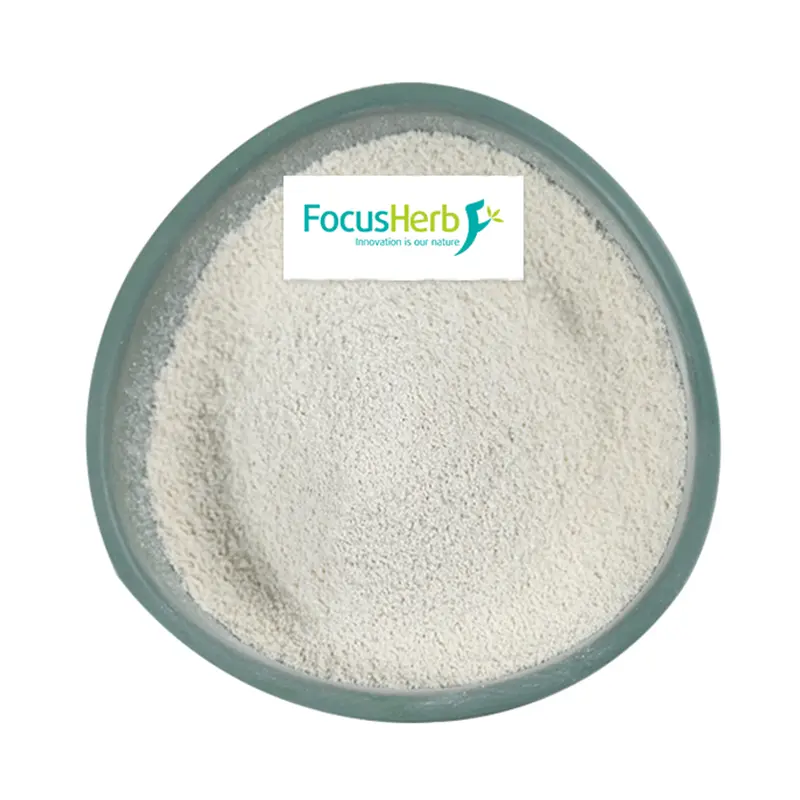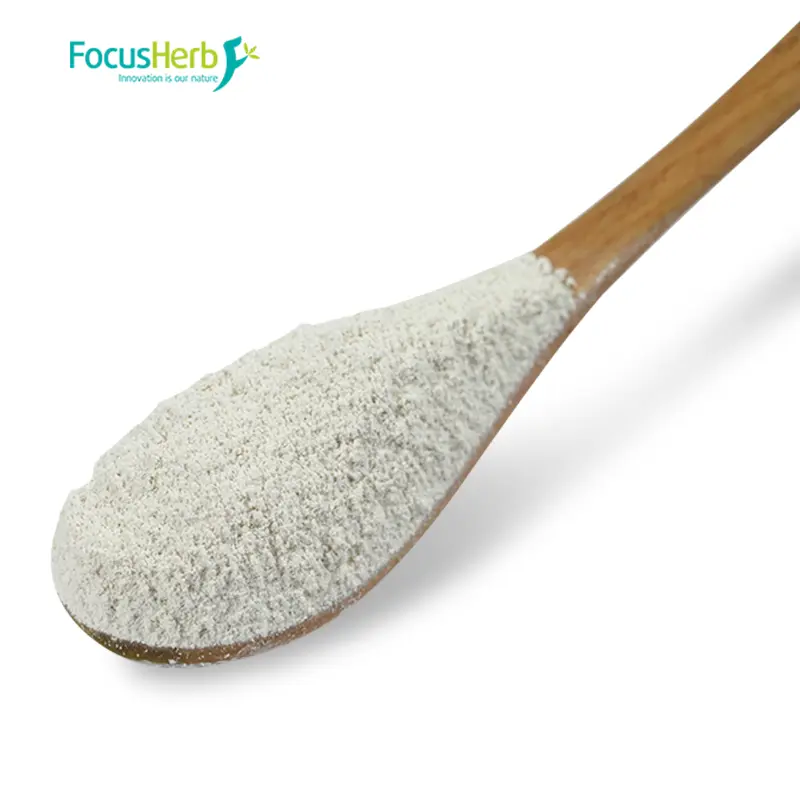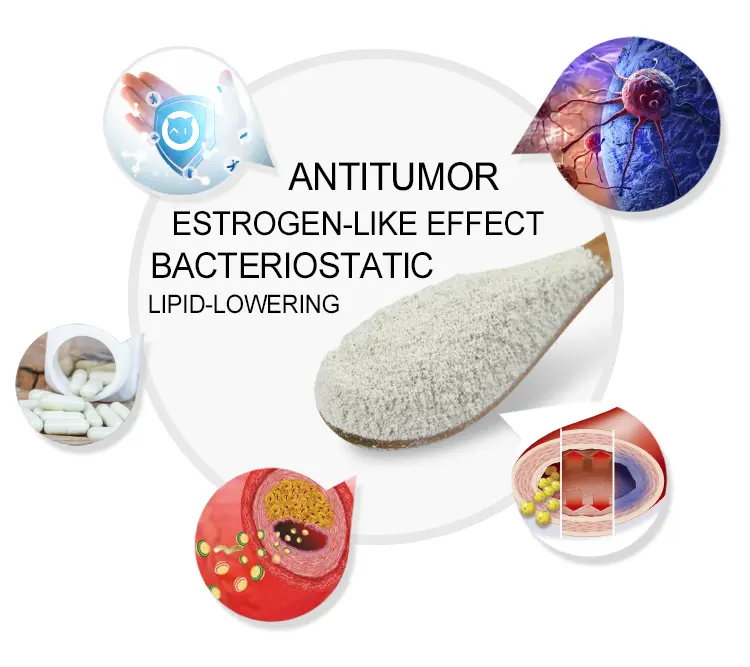Genistein, chemically known as 5,7-dihydroxy-3-(4-hydroxyphenyl)-4H-1-benzopyran-4-one, has a molecular formula of C₁₅H₁₀O₅ and a molecular weight of 270.24. Its molecular structure aligns with the isoflavonoid class of compounds, possessing a unique chemical structure consisting of a phenolic hydroxyl group, a pyrone ring, and a benzene ring. This structure endows genistein with the diverse chemical properties typical of polyphenols, enabling it to exhibit antioxidant activity. By donating hydrogen atoms or electrons, it effectively scavenges free radicals in the body, such as superoxide anion radicals and hydroxyl radicals, reducing oxidative stress damage to cells and tissues and playing a vital role in maintaining the body’s redox balance. Furthermore, due to its structural similarity to estrogen, it can bind to estrogen receptors (ERα/ERβ), exhibiting bidirectional estrogen regulation. When estrogen levels are low, it can mimic the effects of estrogen, binding to receptors and exerting a weak estrogen-like effect. When estrogen levels are high, it can competitively bind to receptors, blocking the effects of estrogen, thereby maintaining relatively stable estrogen levels in the body. This unique estrogen-regulating property gives it potential applications in estrogen-related physiological and pathological processes.
Natural Sources and Preparation Pathways
Genistein is primarily found in soybeans and their products and is the primary active factor among soy isoflavones. During soybean growth, various isoflavones are formed, with genistein playing a significant role. It primarily exists in soybeans as a glycoside (genistin). This form of genistein is hydrolyzed into free aglycones by intestinal flora in the intestines, allowing it to be absorbed and utilized by the body. For example, when we consume soy products, intestinal microorganisms decompose the genistin, releasing free genistein, which then exerts its physiological activity.
In industrial production, the main methods for preparing genistein include plant extraction and chemical synthesis. Plant extraction methods typically use soybean meal as a raw material. This is because soybean meal, the residual product after soybean processing, still contains a certain amount of genistein. Through a series of complex extraction processes, such as extraction with a suitable solvent and purification using techniques such as high-performance liquid chromatography, high-purity genistein can be obtained. This method offers the advantages of a natural and safe product. However, the extraction process is relatively cumbersome and costly, and its yield is limited by the availability of raw materials. Chemical synthesis utilizes chemical synthesis techniques to construct a flavonoid skeleton to produce genistein. This method, through precise control of reaction conditions, allows for large-scale production and can meet the growing market demand for genistein. However, the chemical synthesis process can involve complex chemical reactions and the use of multiple chemical reagents, requiring strict control of product purity and safety. Currently, high-purity (≥98%) genistein products are widely used in functional foods and pharmaceuticals, providing strong support for public health and the prevention and treatment of related diseases.
Core Biological Activities and Health Effects
(I) Estrogen Regulation and Physiological Functions
Due to its unique molecular structure, genistein is able to bind to estrogen receptors in the human body, mimicking or antagonizing estrogen, playing a key role in regulating the human endocrine system.
Genistein has demonstrated outstanding performance in menopausal management. As women age, ovarian function gradually declines, leading to a significant decrease in estrogen secretion. This can trigger a series of menopausal symptoms, such as hot flashes and night sweats, which can severely impact women’s quality of life. Genistein can modulate estrogen receptor expression, thereby affecting the hypothalamic temperature regulation center. Clinical studies have shown that consuming foods or supplements rich in genistein significantly alleviates hot flashes and night sweats in many women. One study of menopausal women found that after 12 weeks of continuous use of a genistein supplement, the frequency and severity of hot flashes were significantly reduced. Genistein also has a positive impact on blood lipid profiles, lowering low-density lipoprotein cholesterol (LDL-C) levels and increasing high-density lipoprotein cholesterol (HDL-C), helping to reduce the risk of cardiovascular disease and safeguarding the health of menopausal women.
Genistein is also crucial for bone health. In postmenopausal women, the sharp drop in estrogen levels increases osteoclast activity and inhibits osteoblast function, leading to rapid bone loss and a significantly increased risk of osteoporosis. Genistein inhibits osteoclast activity, reducing their resorption and destruction of bone tissue. It also promotes osteoblast differentiation and proliferation, enhancing osteoblast function and thus promoting new bone formation. Studies have shown that long-term consumption of foods or supplements containing genistein can effectively improve bone density in postmenopausal women. Compared to selective estrogen receptor modulators (SERMs) such as raloxifene, genistein is comparable in improving bone density, but has the advantage of being natural and having relatively fewer side effects. This provides a safe and effective option for preventing and treating osteoporosis in postmenopausal women.
(II) Potential for Disease Prevention and Treatment
1. Neurodegenerative Disease Intervention
Research at the University of Gdańsk in Poland has provided strong evidence for the role of genistein in neurodegenerative disease intervention, particularly in Alzheimer’s disease treatment. Alzheimer’s disease is a common neurodegenerative disorder characterized by abnormal accumulation of amyloid-β protein (Aβ) in the brain, as well as neuroinflammation and neuronal death, leading to progressive cognitive impairment and memory loss.
Genistein ameliorate the pathological progression of Alzheimer’s disease through multiple mechanisms. First, it inhibits β-secretase, the key enzyme that catalyzes the cleavage of amyloid precursor protein (APP) to produce Aβ. Genistein’s inhibitory effect on β-secretase effectively reduces Aβ production, thereby curbing the progression of Alzheimer’s disease. Second, genistein activates peroxisome proliferator-activated receptor γ (PPARγ), a nuclear receptor involved in various physiological processes in the body, including lipid metabolism and inflammation regulation. Activation of PPARγ promotes the expression of apolipoprotein E (ApoE), which plays an important neuroprotective role in the brain. ApoE binds to Aβ, promoting its clearance and metabolism, reducing its accumulation in the brain, and thereby alleviating its toxic effects on neurons.
Furthermore, recent studies have also revealed a close connection between the gut microbiome and brain health, known as the gut-brain axis. Alzheimer’s disease patients often experience dysbiosis, which further exacerbates neuroinflammation and disease progression. Genistein has the ability to regulate the gut microbiome. It can rebalance the gut microbiome, repair the gut-brain axis, reduce neuroinflammatory responses, and provide a healthier microenvironment for neurons, potentially improving cognitive function in Alzheimer’s patients. These findings suggest that genistein has the potential to become a novel drug or adjunctive therapy for the treatment of Alzheimer’s disease, offering new hope for many patients.
2. Tumor Inhibitory Effects
Genistein plays an important role in tumor suppression, primarily through its role as a tyrosine kinase inhibitor. Tyrosine kinases play a key role in cell signaling pathways, regulating important physiological processes such as cell proliferation, differentiation, migration, and survival. In tumor cells, tyrosine kinase activity is often abnormally elevated, leading to uncontrolled proliferation and metastasis.
The epidermal growth factor receptor (EGFR) signaling pathway plays a crucial role in tumor development and progression. When EGFR binds to its corresponding ligand, it activates a series of downstream signaling molecules, promoting tumor cell proliferation and migration and inducing angiogenesis, providing essential nutrients and oxygen for tumor growth and metastasis. Genistein can specifically block the EGFR signaling pathway, inhibiting tyrosine kinase activity, thereby shutting down tumor cell proliferation and survival signals and suppressing tumor cell proliferation and angiogenesis.
Extensive preclinical studies have demonstrated that genistein has significant inhibitory effects on various tumor cell types, particularly in hormone-dependent cancers such as breast and prostate cancer, demonstrating significant potential for prevention. Studies in breast cancer cell lines have shown that genistein can induce cell cycle arrest in the G1 or G2/M phases, preventing cancer cells from entering the cell division phase and thus inhibiting their proliferation. Genistein can also induce apoptosis, activating intracellular apoptotic signaling pathways and prompting cancer cells to initiate a self-destructive program, thereby reducing their number. In animal studies, a genistein-rich diet or direct injection of genistein effectively inhibited breast and prostate cancer tumor growth and reduced tumor incidence and metastasis. These findings provide a solid theoretical and experimental basis for the application of genistein in cancer prevention and treatment. Although currently in the preclinical research stage, it demonstrates broad application prospects.
3. Cardiovascular Protection Mechanisms
Genistein exhibits significant cardiovascular protective effects, primarily through two key mechanisms: anti-oxidative stress and anti-inflammatory effects. Under normal physiological conditions, the body’s oxidative and antioxidant systems maintain a dynamic balance. However, when the body is stimulated by various internal and external factors, such as hyperlipidemia, hyperglycemia, smoking, and environmental pollution, a large number of free radicals are produced, disrupting this balance and triggering oxidative stress. Excessive free radicals attack vascular endothelial cells, causing peroxidation of cell membrane lipids and damage to proteins and nucleic acids, thereby affecting the normal function of endothelial cells and promoting the development of atherosclerosis.
Genistein has potent antioxidant properties and can enhance the activity of antioxidant enzymes such as superoxide dismutase (SOD). SOD is a key antioxidant enzyme in the body that catalyzes the dismutation of superoxide anion radicals to oxygen and hydrogen peroxide, effectively scavenging excess free radicals, reducing oxidative damage to endothelial cells and protecting their integrity and normal function.
Inflammation also plays a key role in the development and progression of atherosclerosis. Nuclear factor κB (NF-κB) is an important transcription factor that plays a central role in inflammatory signaling pathways. When the body is stimulated by inflammation, NF-κB is activated and enters the cell nucleus, regulating the expression of a series of inflammation-related genes. This leads to the massive release of inflammatory factors such as tumor necrosis factor α (TNF-α) and interleukin-6 (IL-6), triggering an inflammatory response. Genistein can inhibit the activation of the NF-κB pathway, reduce the release of inflammatory factors, and lower the levels of inflammatory markers such as C-reactive protein (CRP). CRP is an acute phase protein, and elevated levels are closely associated with the risk of cardiovascular disease. By inhibiting the inflammatory response, genistein reduces inflammatory damage to the blood vessel wall and slows the progression of atherosclerosis.
Related studies have shown that genistein also has a role in the adjunctive treatment of hyperlipidemia. Hyperlipidemia causes abnormally high levels of lipids in the blood, which are prone to depositing on blood vessel walls and forming plaques, leading to atherosclerosis and cardiovascular disease. Genistein can regulate lipid metabolism, lowering blood cholesterol, triglycerides, and low-density lipoprotein cholesterol levels while increasing high-density lipoprotein cholesterol levels, improving the lipid profile and thus reducing the risk of cardiovascular disease. This makes genistein potentially valuable in the prevention and treatment of cardiovascular disease, providing multifaceted protection for cardiovascular health.
Application Areas: From Functional Foods to Precision Medicine
(I) Foods and Nutritional Supplements
In the functional food sector, genistein has garnered significant attention for its remarkable health benefits. It is often added to soy and grain products to enhance their nutritional value. For example, some fortified soy protein powders contain a certain amount of genistein, allowing consumers to supplement with high-quality protein while also consuming genistein to exploit its estrogen-regulating and antioxidant properties. It is also a key ingredient in dietary supplements, available in tablet or capsule form, allowing for precise, targeted supplementation. While the amount of genistein in each tablet or capsule of common genistein dietary supplements on the market varies, the recommended daily intake for adults is 50-100 mg (as free aglycone) to ensure optimal health benefits within a safe range. However, caution is advised for those taking thyroid medications. Genistein may interact with thyroid medications, affecting their effectiveness or increasing the risk of adverse reactions. Therefore, before taking genistein supplements, consult a doctor or a professional nutritionist to determine an appropriate dosage regimen. Genistein also has specific applications for specific populations. For menopausal women, significant fluctuations in estrogen levels can lead to a range of uncomfortable symptoms, such as hot flashes, night sweats, and osteoporosis. To address this, a comprehensive nutritional supplement specifically designed for menopausal women has emerged, combining genistein with calcium, vitamin D, and other nutrients. Calcium is essential for maintaining bone health, while vitamin D helps promote calcium absorption and utilization. Genistein can regulate estrogen levels and alleviate menopausal symptoms. This comprehensive nutritional supplement addresses the health needs of menopausal women in multiple ways, helping them navigate this challenging period smoothly.
Genistein also plays a crucial role in sports nutrition. High-intensity exercise can easily lead to muscle damage and inflammation, hindering athletes’ training effectiveness and recovery. Sports nutrition formulas containing genistein, leveraging its powerful antioxidant and anti-inflammatory properties, can effectively reduce the damage to muscle cells caused by free radicals produced during exercise, reduce inflammation, promote muscle repair and growth, and help athletes recover faster and improve performance. This has led to genistein’s growing popularity in the sports nutrition market, attracting increasing attention from athletes and fitness enthusiasts.
(II) Pharmaceutical and Cosmetic Development
1. Pharmaceutical Field
In the pharmaceutical field, genistein has demonstrated significant application potential, particularly in Alzheimer’s disease treatment research. Currently, research is actively advancing towards Phase II clinical trials based on genistein’s multi-target “cocktail mechanism.” This “cocktail mechanism” means that genistein can act through multiple targets and pathways, comprehensively intervening in the pathological progression of Alzheimer’s disease. It not only inhibits β-secretase activity and reduces the production of amyloid β protein (Aβ), but also activates peroxisome proliferator-activated receptor γ (PPARγ), promoting apolipoprotein E (ApoE) expression and enhancing Aβ clearance and metabolism. Genistein also possesses antioxidant and anti-inflammatory properties, alleviating neuroinflammation and oxidative stress-induced neuronal damage. The Phase II clinical trial is primarily evaluating the efficacy of genistein in improving cognitive function in patients with early-stage Alzheimer’s disease. Through a series of rigorous cognitive function tests and imaging studies, changes in cognitive ability, memory, and executive function will be observed after taking genistein. If successful, this trial will provide a new, safe, and effective treatment option for Alzheimer’s disease, potentially improving the quality of life for many patients and alleviating the burden on families and society.
In cancer treatment, research on the synergistic and toxicity-reducing effects of genistein in combination with chemotherapy drugs has also yielded impressive results. For example, cisplatin is a commonly used chemotherapy drug in the treatment of ovarian cancer, but long-term use can lead to drug resistance and severe side effects. Studies have found that the combination of cisplatin and genistein significantly enhances the sensitivity of ovarian cancer cells to cisplatin, improving the efficacy of chemotherapy. Genistein can inhibit the expression of resistance-associated proteins in cancer cells, such as P-glycoprotein, preventing cancer cells from excreting chemotherapy drugs out of the cell, thereby increasing intracellular concentrations of chemotherapy drugs and enhancing their anti-cancer effect. Genistein can also alleviate cisplatin-induced adverse reactions, such as nausea, vomiting, and bone marrow suppression. It can enhance the body’s tolerance to chemotherapy drugs by regulating the body’s immune system and antioxidant system, reducing damage to normal tissues and cells. This combination therapy offers new hope for cancer patients, improving treatment efficacy while reducing pain and enhancing quality of life.
2. Cosmetic Applications
In the cosmetics field, genistein, thanks to its excellent anti-aging and anti-inflammatory properties, has become a key active ingredient in numerous skincare products. With aging and environmental factors, collagen in the skin gradually degrades, leading to sagging and increased wrinkling. Genistein exhibits potent anti-aging properties. When topically applied to skincare products containing genistein, it effectively inhibits UVA/UVB-induced expression of matrix metalloproteinases (MMPs). MMPs are enzymes that degrade extracellular matrix components. Their expression increases significantly under UV radiation, leading to excessive degradation of collagen and other extracellular matrix components. Genistein inhibits the expression of MMPs and reduces collagen degradation, thereby maintaining skin elasticity and firmness and minimizing wrinkles. Many anti-wrinkle creams contain genistein, and consumers experience noticeably smoother, more refined skin with reduced wrinkles after long-term use.
For those with sensitive skin, inflammation is a common symptom, manifesting as redness, swelling, itching, and stinging. Genistein has excellent anti-inflammatory and restorative properties, alleviating inflammatory responses in sensitive skin and regulating the balance of the skin’s microbiome. The skin microbiome is the community of microorganisms that reside on the surface of the skin and is closely linked to skin health. An imbalance in the skin microbiome can easily lead to various skin problems. Genistein can regulate the composition and function of the skin microbiome, inhibiting the growth of harmful microorganisms and promoting the proliferation of beneficial microorganisms, thereby improving the skin’s microecological environment and strengthening the skin’s barrier function. Furthermore, genistein modulates inflammatory signaling pathways, reducing the release of inflammatory factors and alleviating inflammatory symptoms. Genistein also has a positive effect on patients with acne and rosacea. It can reduce sebaceous gland secretion, inhibit the growth of Propionibacterium acnes, and improve acne symptoms. It also reduces skin inflammation and erythema in rosacea patients, promoting skin repair and recovery. This has led to genistein’s widespread use in cosmetics for sensitive skin care and problem skin repair, resolving skin concerns for many consumers.
Safety Assessment and Risk Warnings
(I) Toxicological Data and Appropriate Dosage
The safety assessment of genistein is a crucial consideration for its application. Acute toxicity testing is a key step in assessing its safety. Acute toxicity testing in mice revealed a median lethal dose (LD₅₀) of >5000 mg/kg. According to relevant toxicity classification standards, this indicates that genistein is classified as a practically non-toxic substance. This means that if ingested in a single, large dose, genistein presents a low risk of acute toxicity and fatality.
However, the safety of long-term genistein intake should not be overlooked. Studies have shown that long-term (>6 months) genistein intake may affect thyroid function. This is because genistein inhibits the activity of thyroid peroxidase, an enzyme that plays a key role in the synthesis of thyroid hormones. Inhibition of thyroid peroxidase activity interferes with normal thyroid hormone synthesis, thereby affecting thyroid function. For patients with thyroid disease, whose thyroid function is already abnormal, caution is advised when consuming genistein. It is generally recommended that patients with thyroid disease consume less than 50mg of genistein daily and regularly monitor their thyroid-stimulating hormone (TSH) levels. TSH is a key indicator of thyroid function. Regular monitoring of TSH levels can provide timely insights into the effects of genistein on thyroid function, allowing for adjustments to intake or appropriate treatment measures to ensure patient health and safety.
(II) Contraindications and Interactions
1. Pregnancy and Lactation
During pregnancy and lactation, women’s bodies are in a unique physiological state. Genistein consumption during this period may pose potential risks to fetal or infant development. Animal studies have shown that genistein can cross the placenta, meaning it can enter the fetus from the mother. While there is currently no clear evidence that genistein causes fetal teratogenicity, given its potential impact on the fetal endocrine system and other developmental processes, pregnant women are advised to avoid genistein consumption to ensure healthy fetal development. Similarly, for breastfeeding women, genistein may be passed to their infants through breast milk. However, since infants’ bodily functions are not yet fully developed and their ability to metabolize and tolerate various substances is less robust, breastfeeding women should avoid genistein to prevent adverse effects on their infants’ health.
2. Drug Interactions
Genistein interacts with some medications, requiring special attention in clinical use. It can enhance the effects of anticoagulants such as warfarin. Warfarin is a commonly used anticoagulant that works by inhibiting the synthesis of vitamin K-dependent coagulation factors. Genistein may affect warfarin’s metabolism or enhance its inhibitory effect on coagulation factors, thereby increasing the risk of bleeding. Therefore, patients taking anticoagulants such as warfarin must take genistein under the strict guidance of a physician. The physician will carefully assess the risks based on the patient’s specific circumstances, such as coagulation function and medication dosage, and adjust the medication regimen to ensure safe use. When genistein is used in combination with estrogen replacement therapy, it may increase the risk of endometrial hyperplasia. Estrogen replacement therapy is a treatment for conditions such as menopausal syndrome, using exogenous estrogen to alleviate the discomfort caused by decreased estrogen levels. However, genistein itself has estrogen-like effects. When used in combination with estrogen replacement therapy, it may increase estrogen levels in the body, overstimulating the endometrium, leading to endometrial hyperplasia and even increasing the risk of endometrial cancer. To avoid this risk, it is recommended that genistein and estrogen replacement therapy be taken at least two hours apart to minimize their interaction. During treatment, doctors will closely monitor the patient’s endometrial condition, using regular gynecological examinations and ultrasound scans to promptly identify and address any potential problems and safeguard the patient’s health.
Research Progress and Future Outlook
(I) Cutting-Edge Technological Breakthroughs
Liposome encapsulation technology has made significant progress in optimizing delivery systems. Traditional genistein has low bioavailability in the body due to its inherent physicochemical properties, limiting its full potential. Liposome encapsulation, however, encapsulates genistein within liposomes, creating a nanoscale carrier system that effectively improves its solubility and stability, thereby significantly enhancing its bioavailability. Studies have shown that using this advanced liposome encapsulation technology increases genistein’s bioavailability by three times compared to unencapsulated genistein. This enables more efficient absorption and utilization of genistein in the body, opening up new avenues for its application in medicine and nutrition.
Microcapsule formulations targeting the gut microbiome have also demonstrated unique advantages. The gut microbiome plays a crucial role in human health and is closely linked to the development and progression of numerous diseases. This microcapsule formulation can precisely target the gut microbiome, modulating its structure and function to exert its health benefits. For example, it can specifically regulate the abundance of the bacterium Marvinbryantia formatexigens. Under inflammatory conditions, the abundance of Marvinbryantia formatexigens often changes. Microencapsulated formulations targeting the intestinal microbiome can restore its abundance to normal levels, thereby enhancing anti-inflammatory effects and providing a new strategy for treating inflammatory diseases.
The application of synthetic biology has revolutionized the production of genistein. Heterologous synthesis of genistein using engineered yeast is a major breakthrough in synthetic biology. Traditionally, genistein is extracted primarily from plants, a method with significant limitations, such as seasonal and regional restrictions and unstable yields. Heterologous synthesis using engineered yeast overcomes these limitations. It is not subject to seasonal dependence and can be produced on a large scale at any time. Gene editing and metabolic engineering of yeast cells enable efficient synthesis of genistein. This method also reduces production costs by 40% compared to traditional plant extraction methods. This not only enhances the market competitiveness of genistein but also lays a solid foundation for its large-scale application.
(II) Controversies and Challenges
Individual differences significantly influence the metabolism and effects of genistein, with differences in the metabolic capacity of the gut microbiome being a key factor. During metabolism, genistein is converted by the gut microbiome into equol, which has stronger biological activity and plays a key role in genistein’s health benefits. However, the composition and metabolic capacity of the gut microbiome vary significantly between individuals, leading to significant variations in the amount of equol produced. Studies have found that approximately 30% of the population exhibits a “non-converter” phenotype, meaning their gut microbiome is unable to effectively convert genistein into equol, thus limiting genistein’s effectiveness. To address this issue, genetic testing can be an effective tool. By analyzing an individual’s genetic information, we can understand the metabolic capacity of their gut microbiome and thus guide targeted genistein supplementation. Based on genetic testing results, for non-converters, genistein supplementation dosages can be adjusted or other supplemental measures can be employed to improve its metabolism and utilization efficiency in the body, ensuring optimal health benefits.
Currently, there is a significant gap in data regarding long-term effects. While genistein has demonstrated promising short-term health benefits in many studies, relatively little research has examined its long-term effects. Existing clinical studies are mostly short-term, typically lasting less than two years. However, the long-term effects of genistein on breast density, endometrium, and other factors are of particular interest, as these effects may be closely associated with the risk of breast cancer and endometrial cancer. To fill this data gap, large-scale cohort studies are needed, tracking large populations over long periods of time, collecting detailed data, and conducting in-depth analysis of the long-term safety and efficacy of genistein. These studies will provide a more comprehensive understanding of genistein’s mechanisms of action and potential risks, providing a more scientific and reliable basis for its appropriate use and preventing the potential adverse consequences of long-term use.

However, the use of genistein must be scientifically evaluated based on individual health status. Given the impact of individual differences in its metabolism and effects, as well as the lack of long-term data, blind supplementation may carry potential risks. For example, the effects of supplementation may vary among individuals with different metabolic capacities of their gut microbiota, and the effects of long-term use on breast density and the endometrium remain unclear. Therefore, before use, you should fully understand your health status and consult a professional doctor or nutritionist for advice.
Future research on genistein should focus on its long-term safety and in-depth analysis of its mechanisms of action. Large-scale cohort studies will clarify its long-term safety; advanced technologies such as genetic testing, proteomics, and metabolomics will be used to fully reveal its mechanisms of action in the body. Only in this way can the value of this “plant gold” be fully tapped, enabling it to better serve human health and provide more effective solutions to various health issues.























